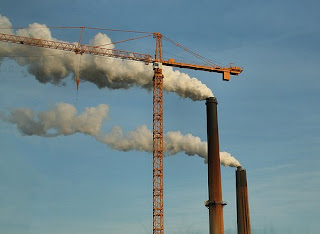Let’s Make Him Do It
 Everybody’s talking nice about greening the economic recovery (if “recovery” is the right word for the ongoing suicide of free-market capitalism).
Everybody’s talking nice about greening the economic recovery (if “recovery” is the right word for the ongoing suicide of free-market capitalism).
At the recent G20 summit in London there was plenty of lip service paid to emissions trading to reduce greenhouse gases. The trouble is, several of the signatory governments are getting cold feet; Uncle Sam being a notable example. Plenty of heavy industries were exempted from paying for carbon-trading permits; most permits ended up being granted for free. Why is this? Unsurprisingly, it is because these countries’ domestic industries started to exert their formidable power.
Time to invoke Uranus, a.k.a. Power of the People.
The Uranus-Saturn opposition is still active up there in the sky; its next exactitude is on 9/15/09, and its last one is on 7/26/10. This is the transit that spells out the tug-of-war between We-the-People and The Powers-That-Be. It suggests that when issues of the common good are on the table, the inspiration for change — as well as the follow-through — has to come from, well, us. If we want a green planet, ordinary people, not agencies or governments in league with big money, are going to have to make it happen.
I think we all know this. I doubt that there is anyone who believes that the captains of industry who’ve been making billions off planetary desecration for centuries are going to stop of their own accord. I don’t imagine there are any magazine readers out there who infer from Chevron’s glossy double-page we’re-saving-the-Earth ads that these gentlemen have had a change of heart. Or who think that because the Exxon Valdez changed its name to The SeaRiver Mediterranean (!), their karma from committing the most notorious oil spill in environmental history has been wiped clean.
Moreover, over the past year, political naïveté in the USA has been dealt a major blow. Americans are reluctantly waking up to the fact that their chosen representatives, no matter which side of the aisle they sit on, are quite uniformly beholden to the Big brothers: Big Oil, Big Agra and/or Big Auto. Not to mention the most ecocidal Big Brother of them all, the one you never hear mentioned in discussions of ecological or economic reform: the Defense Department.
The economic meltdown has had only one effect that qualifies as thoroughly bi-partisan: disillusionment (Neptune/Chiron/Jupiter on the US Moon). Angry Republicans and earnest liberals alike have grown hip to the fact that their country’s financial system has been gamed and gutted. And observers from both camps have been shocked – shocked! –to hear that the looting was aided and abetted by their very own congresspersons; most egregiously, by those who quietly passed laws during the Clinton administration that redefined what the lending industry was doing. That is, they legally re-branded felonies as cool new trading practices.
Among Democrats, even the most stalwart party faithful must surely realize that career politicians have no incentive to orchestrate deep-structure reform. Remember all the hoopla surrounding the Democratic sweep three Novembers ago? Exultant voters allowed themselves to believe that, finally, the “liberal” party would use their new power to stop Bush’s war. Didn’t happen.
Obamaphiles have given their hero a lot of slack. That’s fine; he deserves it. Big job, big problems. But at some point even his most ardent fans are going to have to ditch the president-as-all-knowing-father trip and exchange it for a systemic point of view.
We need to replace the mass media’s version of “politics” – a football game between two teams wearing different-colored shirts – with an understanding of the real forces that wield power in American society. In contrast with these forces, the chief executive plays a relatively minor and largely symbolic role.
There are enormous shifts of consciousness assaulting the American mass intelligence right now. Ideally, these would include a new realism about the factors that actually, not theoretically, create our national policies: the power of money (Pluto), the power of stasis and fear (Saturn) and the power of large numbers of people insisting on a new, improved scheme of things (Uranus).
Meanwhile, the globe is under duress. Scientists worldwide forecast that sea levels will rise for centuries even if greenhouse gas emissions are halted immediately. Most of the European signatories aren’t meeting their Kyoto targets and, astonishingly, are building new coal plants instead. At the G20 summit, the European Union, happy for an excuse to stall, claimed they were waiting for a climate-change commitment from Washington before they could make their next move.
There is a lot of talk about Washington playing the leadership role in turning global warming around. But Obama is walking a tightrope. According to a Gallup Poll, right now Americans are more worried about money than about the environment. The GOP is loving this, of course: they get a lot of traction from fear. “Middle-of-the-road” Democrats (whom Jim Hightower dismissed with the great line: “There’s nothing in the middle of the road but a dead armadillo”) are pandering to their spooked bases, too, with the despicable lie that going green will send the country to the poorhouse.
In Copenhagen this December there’s going to be another big climate summit, where our esteemed world leaders are all going to try to agree on a new Kyoto-type protocol. Who’s going to get Obama’s mouth and actions to work together? We are. If it’s going to happen, it has to be us.
FDR was once approached by a supporter asking him to commit to a cause they both knew was just. The practical old player replied, “I agree with you. Now make me do it.”
